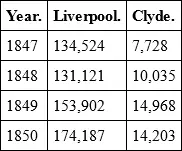Various - Blackwood's Edinburgh Magazine, Volume 69, No. 425, March, 1851
Здесь есть возможность читать онлайн «Various - Blackwood's Edinburgh Magazine, Volume 69, No. 425, March, 1851» — ознакомительный отрывок электронной книги совершенно бесплатно, а после прочтения отрывка купить полную версию. В некоторых случаях можно слушать аудио, скачать через торрент в формате fb2 и присутствует краткое содержание. Издательство: Иностранный паблик, Жанр: periodic, foreign_edu, Путешествия и география, на английском языке. Описание произведения, (предисловие) а так же отзывы посетителей доступны на портале библиотеки ЛибКат.
- Название:Blackwood's Edinburgh Magazine, Volume 69, No. 425, March, 1851
- Автор:
- Издательство:Иностранный паблик
- Жанр:
- Год:неизвестен
- ISBN:нет данных
- Рейтинг книги:3 / 5. Голосов: 1
-
Избранное:Добавить в избранное
- Отзывы:
-
Ваша оценка:
- 60
- 1
- 2
- 3
- 4
- 5
Blackwood's Edinburgh Magazine, Volume 69, No. 425, March, 1851: краткое содержание, описание и аннотация
Предлагаем к чтению аннотацию, описание, краткое содержание или предисловие (зависит от того, что написал сам автор книги «Blackwood's Edinburgh Magazine, Volume 69, No. 425, March, 1851»). Если вы не нашли необходимую информацию о книге — напишите в комментариях, мы постараемся отыскать её.
Blackwood's Edinburgh Magazine, Volume 69, No. 425, March, 1851 — читать онлайн ознакомительный отрывок
Ниже представлен текст книги, разбитый по страницам. Система сохранения места последней прочитанной страницы, позволяет с удобством читать онлайн бесплатно книгу «Blackwood's Edinburgh Magazine, Volume 69, No. 425, March, 1851», без необходимости каждый раз заново искать на чём Вы остановились. Поставьте закладку, и сможете в любой момент перейти на страницу, на которой закончили чтение.
Интервал:
Закладка:
The very magnitude of the trade employed in the exportation of the emigrants, and the importation of food for those who remain, has gone far to conceal the ruinous effects of Free Trade. Between the carrying out of emigrants, and the bringing in of grain – the exportation of our strength, and the importation of our weakness – our chief seaports may continue for some time to drive a gainful traffic. The Liverpool Times observes: —
"The number of emigrant vessels which sailed from Liverpool during the last year, was 568. Of these vessels, many are from 1500 to 2000 tons burden, and a few of them even reach 3000 tons. They are amongst the finest vessels that ever were built, are well commanded, well-manned, fitted out in excellent style, and present a wonderful improvement in all respects, when compared with the same class of vessels even half a dozen years ago. Taking the average passage-money of each passenger in these vessels at £6, the conveying of emigrants yields a revenue of upwards of £1,000,000 sterling to the shipping which belongs to or frequents this port, independent of the great amount of money which the passage of such an immense multitude of persons through the town must cause to be spent in it. In fact, the passage and conveyance of emigrants has become one of the greatest trades of Liverpool." — Liverpool Times , Jan. 10, 1851.
The number of emigrants from the Mersey and the Clyde, since the days of Free Trade began, have been prodigious, and rapidly increasing. They have stood thus: —

It was precisely the same in the declining days of the Roman empire – the great seaport towns continued to flourish when all other interests in the state were rapidly sinking; and when the plains in the interior were desolate, or tenanted only by the ox or the buffalo, the great cities were still the abodes of vast realised wealth and unbounded private luxury. We are rapidly following in the same path. The realised capital of Great Britain was estimated in 1814 at L.1,200,000,000; in 1841, Mr Porter estimated it at L.2,000,000,000; the capital subject to legacy duty in Great Britain, on an average of forty-one years, from 1797 to 1841, was L.26,000,000; in the single year 1840 it was L.40,500,000. The increase of realised capital among the rich has been nearly as great as that of pauperism, misery, and consequent emigration among the poor – the well-known and oft-observed premonitory symptoms of the decline of nations.
It is in the midst of these numerous and overwhelming evils, the result mainly of theoretical innovation and class government in the country – when above two millions of paupers in the two islands are painfully supported by public assessment; when three hundred thousand are annually driven into exile, and a hundred and fifty thousand more are constantly supported in jails, one-half of whom are committed for serious crimes; 17 17 Including the police committals, much more numerous than those for trial.
when all classes, excepting those engaged in the export trade of human beings and the import of human food, are languishing from the decline of domestic employment, and the constantly increasing influx of foreign goods, both rude and manufactured – that we are assured by one benevolent set of philanthropists that all will be right, if we only give the starving working-classes model houses, rented at L.8 each, to live in; by another, that ragged schools for their destitute children will set all in order; by a third, that a schoolmaster in every wynd is alone required to remove all the evils under which we labour; by a fourth, that cold baths and wash-houses to lave their emaciated limbs, are the great thing; by a fifth, that church extension is the only effectual remedy, and that, till there is a minister for every seven hundred inhabitants, it is in vain to hope for any social amelioration. We respect the motives which actuate each and all of these benevolent labourers in the great vineyard of human suffering; we acknowledge that each within a limited sphere does some good, and extricates a certain number of individuals or families out of the abyss of degradation or suffering in which they are immersed. As to anything like national relief, or alleviation of distress in any sensible degree, from their united efforts, when the great causes of evil which have been mentioned continue in undiminished activity, it is as chimerical as to expect by the schoolmaster or the washing-woman to arrest the ravages of the plague or the cholera.
Two circumstances of general operation, and overwhelming importance, render all these various and partial remedies, while the great causes which depress the demand for labour and deprive the people of employment continue in operation, entirely nugatory and ineffectual, in a general view, to arrest our social evils.
The first of these is, that these remedies, one and all of them, are calculated for the elevation and intellectual or moral improvement of the people, but have no tendency to improve their circumstances, or diminish the load of pauperism, destitution, and misery with which they are overwhelmed. Until the latter is done, however, all the efforts made for the attainment of the former, how benevolent and praiseworthy soever, will have no general effect, and, in a national point of view, may be regarded as almost equal to nothing. The reason is that, generally speaking, the human race are governed, in the first instance, almost entirely by their physical sufferings or comforts, and that intellectual or moral improvement cannot be either thought of or attended to till a certain degree of ease as to the imperious demands of physical nature has been attained. In every age, doubtless, there are some persons of both sexes who will heroically struggle against the utmost physical privation, and pursue the path of virtue, or sedulously improve their minds, under circumstances the most adverse, and with facilities the most inconsiderable. But these are the exceptions, not the rule. The number of such persons is so inconsiderable, compared to the immense mass who are governed by their physical sensations, that remedies addressed to the intellect of man, without reference to the improvement of his circumstances, can never operate generally upon society. Even the most intellectual and powerful minds must give way under a certain amount of physical want or necessity. Take Newton and Milton, Bacon and Descartes, Cervantes and Cicero, and make them walk thirty miles in a wintry day, and come in to a wretched hovel at night, and see what they will desire. Rely upon it, it will be neither philosophy nor poetry, but warmth and food. A good fire and a good supper would attract them from all the works which have rendered their names immortal. Can we expect the great body of mankind to be less under the influence of the imperious demands of our common physical nature than the most gifted of the human race? What do the people constantly ask for? It is neither cold baths nor warm baths, ragged schools nor normal schools, churches nor chapels, model houses nor mechanics' institutes – "It is a fair day's wage for a fair day's work." We would all do the same in their circumstances. Give them that , the one thing needful alike for social happiness and moral improvement, and you make a mighty step in social amelioration and elevation; because you lay the foundation on which it all rests, and on which it must, in a general point of view, all depend – without it, all the rest will be found to be as much thrown away as the seed cast on the arid desert.
In the next place, the intellectual cultivation and elevation which is regarded by so large a political party, and so numerous a body of benevolent individuals, as the panacea for all our social evils, never has affected, and never can affect, more than a limited class in society. We may indeed teach all, or nearly all, to read; but can we make them all read books, or still more, read books that will do them any good, when they leave school, and become their own masters, and are involved in the cares, oppressed with the labours, and exposed to the temptations of the world? Did any man ever find a fifth of his acquaintance of any rank, from the House of Peers and the Bar downwards, who were really and practically directed in manhood and womanhood by intellectual pleasures or pursuits? Habit, early training, easy circumstances, absence of temptation, a fortunate marriage, or the like, are the real circumstances which retain the great body of the human race of every rank in the right path. They are neither positively bad, nor positively good: they are characters of imperfect goodness, and mainly swayed by their physical circumstances. If you come to a crisis with them, when the selfish or generous feelings must be acted upon, nine-tenths of them will be swayed by the former. The disciples of Rousseau will contest these propositions: we would only recommend them to look around them, and see whether or not they are demonstrated by every day's experience in every rank of life. We wish it were otherwise; but we must take mankind as they are, and legislate for them on their average capacity, without supposing that they are generally to be influenced by the intellectual appliances adapted only to a small fraction of their number. And, accordingly, upon looking at the statistical tables given in the commencement of this Essay, it will be found that, while emigration, crime, and pauperism, have advanced rapidly, despite all the efforts of philanthropy and religion, which are permanent , but affect only a part of society, they exhibit the most remarkable fluctuations, according to the prosperity or distress of particular years, because the causes then in operation affected the whole of mankind.
Читать дальшеИнтервал:
Закладка:
Похожие книги на «Blackwood's Edinburgh Magazine, Volume 69, No. 425, March, 1851»
Представляем Вашему вниманию похожие книги на «Blackwood's Edinburgh Magazine, Volume 69, No. 425, March, 1851» списком для выбора. Мы отобрали схожую по названию и смыслу литературу в надежде предоставить читателям больше вариантов отыскать новые, интересные, ещё непрочитанные произведения.
Обсуждение, отзывы о книге «Blackwood's Edinburgh Magazine, Volume 69, No. 425, March, 1851» и просто собственные мнения читателей. Оставьте ваши комментарии, напишите, что Вы думаете о произведении, его смысле или главных героях. Укажите что конкретно понравилось, а что нет, и почему Вы так считаете.












